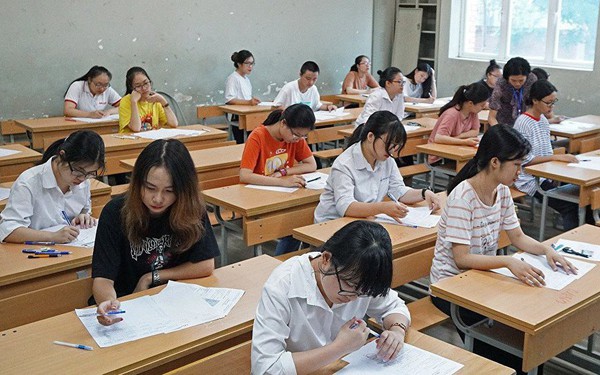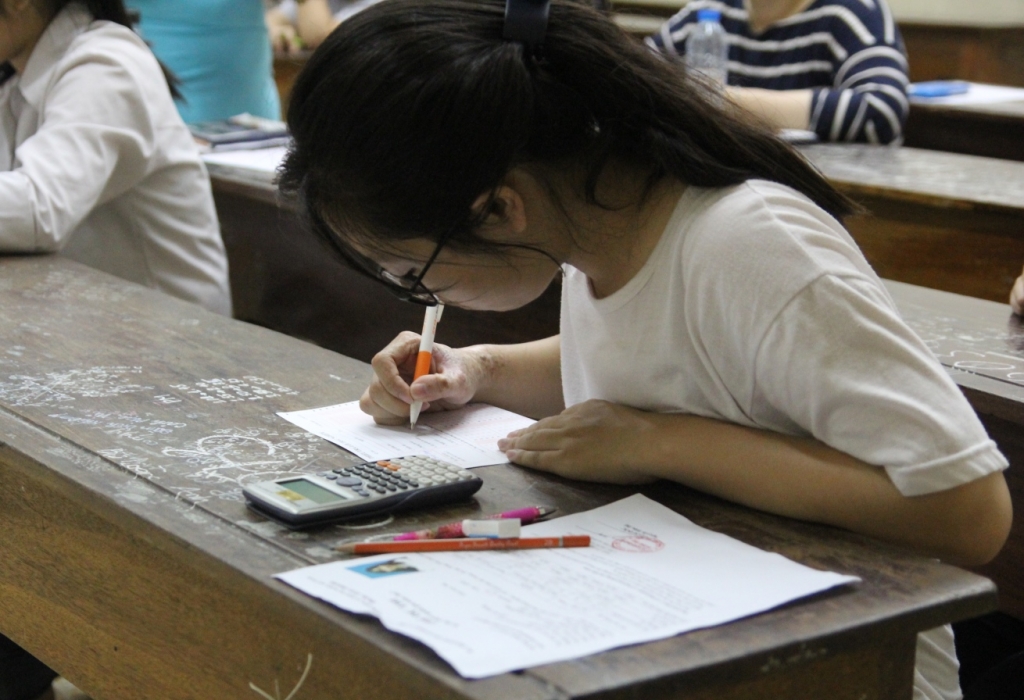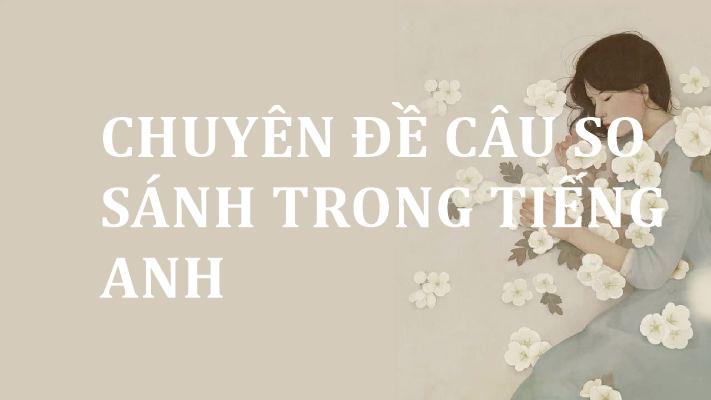Đề thi ôn tập Unit 1 môn Tiếng Anh lớp 10
UNIT 1-FAMILY LIFE
I.Choose the word whose underlined part is pronounced differently from the others.
|
1.A.create |
B. critical |
C. recreation |
D. acre |
|
2.A. parents |
B. family |
C. happy |
D.frankly |
|
3. A. chore |
B. women |
C. enormous |
D. overall |
|
4. A. bread |
B. embrace |
C. fiber |
D. brother |
|
5. A. train |
B. track |
C. center |
D. instrument |
|
6. A. duty |
B. mum |
C. movement |
D. true |
|
7. A. prepare |
B. together |
C. tend |
D. equal |
|
8. A. sociable |
B. nurture |
C. solution |
D. share |
|
9. A. traditional |
B. career |
C. around |
D. washing |
|
10.A. teeth |
B. strength |
C. with |
D. both
|
II.Choose the word which has a different stress pattern from that of the others
|
1.A.household |
B. laundry |
C.finance |
D. extend |
|
2.A.nuclear |
B. require |
C. routine |
D. divide |
|
3.A.responsible |
B. preparation |
C. individual |
D. beneficial |
|
4.A.consider |
B. relation |
C. atmosphere |
D. contribute |
|
5.A.homemaker |
B. example |
C. breadwinner |
D. positive |
|
6.A.afraid |
B. burden |
C. gender |
D. iron |
|
7.A.financial |
B. convergence |
C. grocery |
D. parental |
|
8.A.rubbish |
B. manage |
C. divorce |
D. realize |
|
9.A.urgent |
B. husband |
C. housework |
D. protect |
|
10.A.similar |
B. ungrateful |
C. vulnerable |
D. benefit
|
III.Choose the best answers to complete the sentences :
1. Women whose husband do not contribute to household chores are more vulnerable to illness.
|
A. happy |
B.easy to be hurt |
C. hard |
D. friendly |
2. Tom: “Which of the chores do you dislike doing the most ?”=>Jerry: “ “.
A. I like cooking and sweeping the floor B. I do the laundry, cook and wash the dishes
C. Well, my favorite activity is doing the washing-up
D. Washing the dishes, because I often break things when I do the washing-up
3. As a housewife, she stays at home and her children. She takes care of them, feeds them and
protects the to develop.
|
A. nurtures |
B.nurture |
C. nature |
D. natures |
4. It is unfair to state that a woman’s job is to look everyone in the family and takes the house
|
A. in-on |
B.after-in |
C. of-of |
D. after-of |
5. “The lecturer splits the students into 4 groups” has closest meaning to .
|
A. The lecturer divides the students into 4 groups |
B. The lecturer divided the students into 4 groups |
|
C. The lecturer goes into 4 groups of students |
D. The lecturer went into 4 groups of students |
6. “ They equally share the parenting” has the closest meaning to .
|
A. They are all unemployed |
B. They take care of each other |
|
C. They come back home at the same time |
D. They share the housework and childcare evenly |
7. is the state where things are of equal weight or force.
|
A. Balance |
B.Changing |
C. Moving |
D. Importance |
8.David’s part-time job requires a lot of . Therefore, he usually carries the boxes weighing up to 50 kilos and he needs effort and energy to move them.
|
A. light lifting |
B.easy carrying |
C. heavy lifting |
D. simple chores |
9. According to a survey, a lot of young people prefer to live in families which consist of parents and children.
|
A. nuclear |
B.extended |
C. three generations |
D. four generations |
10. The family, which consists of three or even four generations, is only popular in some regions today.
|
A. nuclear |
B.extended |
C. intended |
D. small
|
IV. Give the correct form of the words in brackets:
1. To be fair, we need to divide the task ( equal )
2. My Mom and Dad are checking the for their gold wedding anniversary ( prepare )
3. Heavy lifting is an action which requires strength ( physic )
4. It is good for them as individuals and good for all the within the family. ( relate )
5. say that a lot of young people are not aware of these advantages ( psychology )
6. Her to the company is normous ( contribute )
7. In order to maintain peace, we should not be of each other ( critisize )
8. I want to see the very cute and lovely children at school ( nurse )
9. Mary and her husband always join hands in their children ( eduacte )
10. A person will be considered if he or she does not take good care of his or her parents or grandparents ( grate )
V. Rearrange the words / phrases to make meaningful sentences:
1. is / at the moment / the / improving / financial / company’s / situation
2. want / the / be / to / quiet / hear / I / news
3. retiring / Linda / is / of / thinking / early / she / anymore / because / isn’t / happy / at work
4. of / the / wild / number / falling / buterflies / is
5. oil supplies / some experts / say / / will / the next 20 years / start / / to fall / within / that
VI. Finish each of the following sentences in such a way that it means the same as the sentence printed before it.
1. I’m looking for a job as a secretary=>I am trying ……………………………………………………….
2. Tim will be sixteen next week=>It’s Tim’s sixteenth ……………………………………………………
3. The price of the holiday includes all meals=>All meals ………………………………………………….
4. Father doesn’t want you to keep these disgusting insects=>Father wants you to get …………………….
5. I’m on the way to the cinema=>I’m ………………………………………………………………………
VII. Read the passage and choose the best answers:
"Today’s (1) for measurable childhood success-from the Common Core to college placement-have chased (2) chores from the to-do lists of many young people. In a survey of 1,001 U.S. adults released last fall by Braun Research, 82% reported having regular chores growing up, but only 28% said that they require their own children to do them. With students (3) pressure to learn Mandarin, run the chess club or get a varsity letter, chores have fallen victim to the imperatives of resume-building—though it is hardly clear that such activities are a better use of their time.
“Parents today want their kids spending time on things that can bring (4) success, but ironically, we’ve stopped doing one thing that’s actually been a proven predictor of success-and that’s household chores,” says Richard Rende, a developmental psychologist in Paradise Valley, Ariz., and co-author of the forthcoming book “Raising Can-Do Kids.” Decades of studies (5) the benefits of chores-academically, emotionally and even professionally."
|
1.A. demand |
B. demands |
C. interest |
D. interest |
|
2. A. household |
B. social |
C. breadwinner |
D. society |
|
3. A. on |
B. for |
C. of |
D. under |
|
4. A. him |
B. it |
C. them |
D. they |
|
5. A. show |
B. showing |
C. shows |
D. is showing |
6. How many percents of US aldults require their own children to do the houshold chores ?
|
A. 82 |
B.28 |
C. 100 |
D. 54 |
7. What do parents today want their kids to spend their time on ?
|
A. things that can bring them success |
B. things that they can sell |
|
C. leisure |
D. sport
|
VIII. Read the passage below and choose the best answer (A, B, C or .D) to each question.
When I was younger, I hated being the oldest child and the only girl in my family. But now I am older, I realize that being 'Big Sister' actually has its advantages. First of all, I get special treatment from my parents and brothers. I get my on room, and brothers have to do all the heavy work around the house. Another benefit is that, being the oldest, I have learned to be responsible and dependable. For example, my parents often leave my brothers in my care when they go out. I also try my best in whatever I do in order to be a good example for my brothers. The experience I've had in taking care of my brothers has prepared me for my own family in the future. So, even though I didn't choose to be the oldest child and the only girl in my family, I have succeeded in making this situation work to my best advantage.
1. The writer disliked __________when she was younger.
A. having too many brothers in her family B. being the oldest child and the only girl in her family
C. being the only child in her family D. getting special treatment from her parents and brothers
2. 'Big Sister' means ___________
A. the only child B. the biggest sister C. the eldest sister D. the oldest person
3. She has to __________ when her parents go out.
A. look after her brothers B. cook every meal C. do heavy work around the house D. lay the table for dinners
4. She has __________ in making the situation work to her best advantage.
A. liked B. failed C. chosen D. succeeded
5. When the writer grows up, she finds it is __________ to be a big sister.
A. boring B. enjoyable C. unacceptable D. miserable
IX. Read the passage below and choose the best answer (A, B, C or D) to each question.
SIBLINGS
When we are children, our sibling - that is, our brothers and sisters - are our first friends and first enemies. At the end of life, they are often our oldest friends and oldest enemies. The effect of sibling relationships in childhood can last a lifetime. Many experts say that the relationship among brothers and sisters explains a great deal about family life, especially today when brothers and sisters often spend more time with one another than with their parents.
Studies have shown that sibling relationships between sister-sister pairs and brother-brother pairs are different. Sister pairs are the closest. Brothers are the most competitive. Sisters are usually more supportive of each other. They are more talkative, frank, and better at expressing themselves and sharing their feelings. On the other hand, brothers are usually more competitive with each other.
Experts agree that the relationship among siblings is influenced by many factors. For example, studies have shown that both brothers and sisters become more competitive and aggressive when their parents treat them even a little bit differently from one another. But parental treatment is not the only factor. Genetics, gender, life events, people, and experiences outside the family all shape the lives of siblings. Recently, one researcher demonstrated another factor: in sibling relationships. It was discovered that children dislike watching their siblings fight. In fact, they respond to arguments by taking sides -supporting one sibling and punishing the other.
1. What is the main idea of the first paragraph?
A. Siblings are our oldest friends in life. B. Siblings are our oldest enemies in life.
C. Sibling relationships are among the most important relationships in life.
D. Some siblings have good relationships, but other siblings have bad relationships.
2. What is the main idea of the second paragraph?
A. Sisters get along better with their sisters than with their brothers.
B. Females and males generally have different sibling relationships.
C. Siblings spend a lot of time together because they have to.
D. Brothers usually tend to be competitive with sisters.
3. What is the main idea of the third paragraph?
A. There are many causes of good and bad sibling relationships.
B. Research has shown that siblings hate to fight.
C. Siblings often support or punish one of their brothers or sisters in an argument.
D. Siblings are often indifferent to their parental treatment.
4. Which of the following is NOT true about siblings?
A. Sibling relationships between sister-sister pairs and, brother-brother pairs are different.
B. Brother-brother pairs are the most competitive.
C. Sister-sister pairs are the closest.
D. Brothers are more talkative than sisters.
5. Which of the following is true about siblings?
A. Children avoid arguments that their siblings have.
B. The relationship among brothers and sisters-explains a lot about family life.
C. Parental treatment is the only factor that influences the, relationships among siblings.
D. Genetics and gender don't impact on the lives of siblings.
ĐÁP ÁN:
I.
|
1.D |
2.A |
3.B |
4.C |
5.C |
|
/ˈeɪ.kər/ |
/ˈpeə.rənt/ |
/ˈwɪm.ɪn/ |
/ˈfaɪ.bər/ |
/ˈsen.tər/ |
|
6.B |
7.D |
8.B |
9.D |
10.C |
|
/mʌm/ |
/ˈiː.kwəl/ |
/ˈnɜː.tʃər/ |
/ˈwɒʃ.ɪŋ/ |
/wɪð/ |
II.
1.D 2.A 3.A 4.C 5.B 6.A 7.C 8.C 9.D 10.B
III.
1.B vulnerable = easy to be hurt: dễ bị tổn thương
2.D Tom:”Công việc nhà nào mà bạn không thích làm nhất”=>Jerry: “Rửa chén, bởi vì tôi thường làm vỡ thứ gì đó trong lúc rửa”.
3.A Chia thì theo động từ stays phía trước với S số ít “She”
4.D Look after-of: chăm sóc
5.A splits=divides: chia (phần)
6.D equally share the parenting=share the housework and childcare: chia sẻ công việc nội trợ và chăm sóc con cái
7.A “Cân bằng” là trạng thái mà mọi thứ có trọng lượng hoặc lực bằng nhau
8.C heavy lifting: mang vác nặng
9.A nuclear families: gia đình 2 thế hệ
10.B extended family: gia đình 2 thế hệ trở lên
IV.
1. equally 2. preparation 3. physical 4. relationship 5. psychologists
6. contribution 7. critical 8. nursery 9. educating 10. ungrateful
V.
1. The company’s financial situation is improving at the moment
2. Be quiet ! I want to hear the news
3. Linda is thinking of retiring early because she isn’t happy at work anymore.
4. The number of buterflies is falling
5. Some experts say that oil supplies will start to fall within the next 20 years
VI.
1. …………… to find a job as a secretary.
2. …………. birthday next week.
3. ………….. are included in the price of the holiday
4. …………… rid of these disgusting insects
5. …………… going to the cinema
VII.
1.B demands 2.A household
3.D under 4.C them
5.A show 6.B 28
7.A things that can bring them success
VIII.
1.B 2.C 3.A 4.D 5.B
IX.
1.C 2.B 3.A 4.D 5.B
CHÚC CÁC BẠN HỌC TỐT <3







